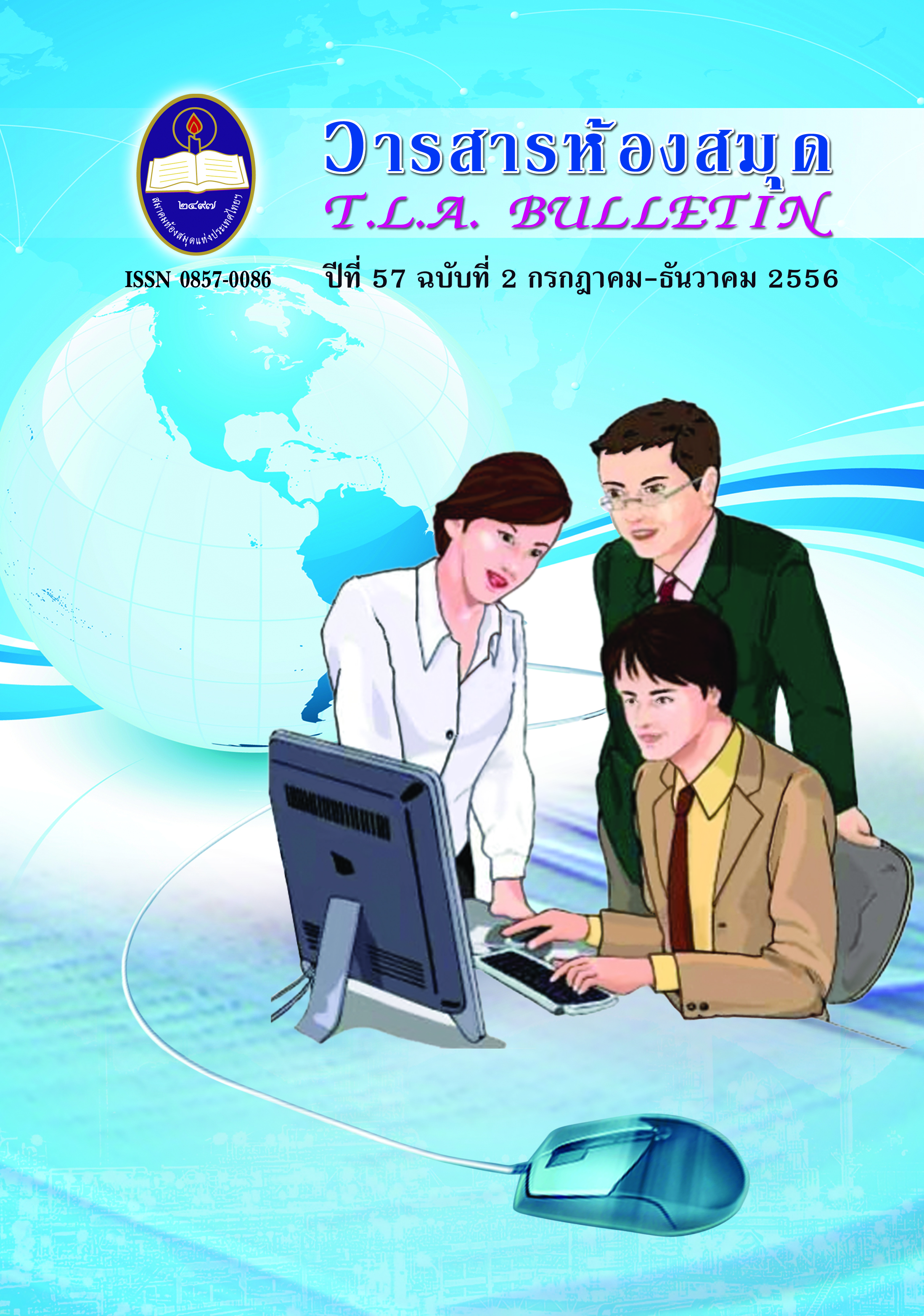ทางรอดของห้องสมุดทางการแพทย์ : บรรณารักษ์และสมรรถนะที่คาดหวังกับบทบาทใหม่ที่สร้างมูลค่าเพิ่มแก่วิชาชีพ
คำสำคัญ:
ห้องสมุดทางการแพทย์บทคัดย่อ
ผู้เขียนได้ถอดความและนำเสนอข้อมูลของประเทศไทยต่องานวิจัยของ ดร.จิลเลี่ยน ฮาแลม ศาสตราจารย์วุฒิคุณ มหาวิทยาลัยเทคโนโลยีควีนสแลนด์ เมืองบริสเบน ประเทศออสเตรเลีย งานวิจัยมีวัตถุประสงค์เพื่อศึกษาขอเขตงานของบรรณารักษ์วิชาชีพในออสเตรเลีย เพื่อนำมาใช้เป็นตัวกำหนดสมรรถนะหลักด้านความรู้พื้นฐาน และสมรรถนะเฉพาะตำแหน่งอันเป็นคุณสมบัติที่พึงประสงค์ของบรรณารักษ์ในอนาคต
ผลการวิจัยนี้พบว่า บรรณารักษ์ทางการแพทย์ในประเทศออสเตรเลียมีขอบเขตภาระงานกว้างเกินไป และต้องทำงานหลายอย่าง ทำให้ขาดความเชี่ยวชาญเฉพาะทางในเชิงลึก ยิ่งไปกว่านั้น ยังขาดพื้นฐานความรู้ด้านวิทยาศาสตร์การแพทย์ เนื่องจาก ในการขึ้นทะเบียนวิชาชีพไม่มีข้อกำหนดคุณสมบัติด้านความรู้ทางวิทยาศาสตร์การแพทย์ไว้นอกจากนี้ บรรณารักษ์ขาดความมุ่งมั่นท่จะคงความเข็แข็งทางวิชาชีพและสิ่งสำคัญที่สุดนั้น พบว่า บรรณารักษ์ทางการแพทย์ขาดความรู้ ความเชี่ยวชาญที่จำเป็นสำหรับงานบรรณษรักษ์ทางการแพทย์
การเพิ่มมูลค่าแก่บรรณารักษ์ทางการแพทย์นั้น เป็นสิ่งจำเป็นเร่งด่วนที่ต้องทำเพื่อความอยู่รอดท่ามกลางสิ่งแวดล้อมด้านบริการสุขภาพที่เปลี่ยนแปลงไปอย่างรวดเร็ว บรรณารักษ์จึงจำเป็นต้องแสดงบทบาทใหม่ให้เห็นถึง ประสิทธิภาพเชิงกลยุทธ์ของบรรณารักษ์ที่มีต่อองค์กร ทั้งด้านการศึกษา การบริหาร และการบริการ ทำตนให้เป็นที่ยอมรับดุจสมาชิกคนสำคัญของทีมอาชีพในวงการแพทย์ และกลไกหนึ่งซึ่งสมาคมวิชาชีพพยายามทำอยู่เพื่อช่วยสร้างมูลค่าเพิ่มนี้ก็คือความพยายามสร้างหลักสูตรประกาศนียบัตรรับรองความเชี่ยวชาญเฉพาะทางและผลักดันให้กำหนดเป็นหลักสูตรภาคบังคับซึ่งบุคลากรห้องสมุดทางการแพทย์ทุกคนจำเป็นต้องผ่านการเรียนจบหลักสูตรนี้มาก่อน
บรรณารักษ์ทางการแพทย์ ที่ถูกวาดหวังไว้ในอนาคต ควรมีขอบเขตภาระงานชัดเจนมีสมรรุนะเฉพาะตำแหน่ง มีพื้นฐานความรู้ทักษะที่ช่วยส่งเสริมงานบริการและนำส่งบริการสารสนเทศคุณภาพสูงได้จำเป็นต้องเป็นคนที่พัฒนาตนเองอย่างต่อเนื่องไม่หยุดนิ่ง สามารถถ่ายทอดและปฏิบัติงานด้านบรรณารักษ์ได้อย่างเป็นระบบแบบแผนเดียวกัน ต้องสามารถทำงานสอดประสานกับกิจกรรมหลักขององค์กร และตอบสนองเป้าหมายเชิงกลยุทธ์ขององค์กรได้และบรรณารักษ์ทางการแพทย์จะต้องมีตำแหน่งที่ยืนที่สำคัญในวงการแพทย์ของประเทศออสเตรเลียต่อไป
Downloads
เอกสารอ้างอิง
Professional development scheme. URL: http://www.alia.org.au/education/pd/
scheme.html
Australian Library and Information Association. 2012. (Retrieved 2014 March 28).
Investigation into the value of health library and information services in Australia.
URL: http://www.alia.org.au/sites/default/files/documents/advocacy/
HLI-ALIAValuingHealthInformationServicesReport2012v2.pdf
Bury, R., Martin, L., & Roberts, S. (2006). Achieving change through mutual development: supported online learning and the evolving roles of health and information
professionals. Health Information and Libraries Journal. 23(Suppl.1): 22-31.
CILIP. 2004. (Retrieved 2014 March 26). Future proofing the profession. In report of the
CILIP Health Executive Advisory Group. London, CILIP. URL: http://www.cilip.org.uk/
professionalguidance/sectors/health/futureproofprof.htm
Haines, M. (2005). Future proofing the health library and information profession through
research: the CILIP agenda. Library & Information Research. 30(94): 3-9.
Hallam, G. 2009. (Retrieved 2014 March 28). neXus. An investigation into the library and
information services workforce in Australia: The institutional perspective. Final
report prepared for the Australian Library and Information Association a National
and State Libraries Australia. URL: http://eprints.qut.edu.au/29051/
Hallam, G., Ritchie, A., Hamill, C., Lewis, S., C, N.-S., Kammermann, M., & OuConnor, P.
(2010). Australiaus health libraries: A research-directed future. Library Trends.
59(1): 350-372.
Harrison, J., & Beraquet, V. (2009). Clinical librarians, a new tribe in the UK: roles and
responsibilities. Health Information and Libraries Journal. 27(2): 123-132.
Hill, P. 2008. (Retrieved 2014 March 28). Report of a national review of NHS health
library services in England: from knowledge to health in the 21st century: National
Library for Health. URL: http://www.libraryservices.nhs.uk/document_uploads/
NHS_Evidence/national_library_review_final_report_4feb_081.pdf
Holst, R., Funk, C. J., Adams, H. S., & K, R. (2009). Vital pathways for hospital librarians:
Present and future roles. Journal of the Medical Libraries Association. 97(4):
285-292.
Kibbon, M., Ann, K., & Bayley, L. (2004). Health professional education, evidence-based
health care, and health sciences librarians. Reference Services Review. 32(1):
50-53.
National Health Service. 2012. (Retrieved 2014 March 28). Standards and quality
assurance. URL: http://www.libraryservices.nhs.uk/document_uploads/LQAF/
LQAF_Version_2.2_April_2012_90e8f.pdf
Scherrer, C. S. (2004). Reference librariansu perceptions of the issues they face as a
cademic health information Professionals. Journal of the Medical Libraries
Association. 92(2): 226-232.
Shipman, J. P. (2004). Why emerging roles for health sciences librarians? Reference
Services Quarterly. 32(1): 9-12.
Steyn, C., & Wee, J. A. d. (2007). The naked librarian: health librarians in the modern era.
Library Review. 56(9): 797-802(796).
Sutton, A., & Booth, A. (2012). What type of leader am I?: a training needs analysis of
health library and information managers. Health Information and Libraries Journal.
29(1): 39-46.
University of British Columbia. 2012. (Retrieved 2014 March 28). Top ten librarian
competencies in evidence-based Practice. URL: http://blogs.ubc.ca/dean/2012/
04/top-ten-10-librarian-competencies-in-evidence-based-practice
Wilkinson, A., Papaioannou, D., Keen, C., & Booth, A. (2009). The role of the information
specialist in supporting knowledge transfer: a public health information case study.
Health Information & Libraries Journal. 26(2): 118-125.




